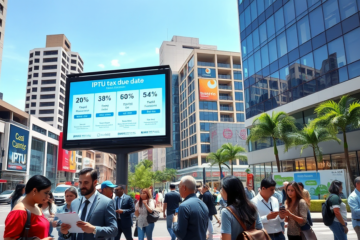LOA 2026 Provides for R$6.5 Trillion in Revenue and a Higher Minimum Wage
The Annual Budget 2026 presents a detailed overview of government revenues and expenditures, with forecasts that will directly impact the lives of Brazilian citizens.
The bill, which estimates a total of R$1.5 trillion, includes important measures such as increasing the minimum wage and allocating resources to essential areas such as health and education.
Furthermore, the document points to expected GDP growth and a commitment to fiscal responsibility, highlighting the importance of budget planning for the country's sustainable development.
2026 Federal Budget Overview
The 2026 Annual Budget Law presents a total budget of R$ 6.5 trillion, covering both public revenues and expenditures.
The proposal highlights a projected minimum wage of R$ 1,631, representing a nominal increase of 7,45%.
This increase in the minimum wage is essential, as it reflects efforts to provide greater purchasing power to the working population.
Furthermore, the growth of Gross Domestic Product (GDP) for 2026 is estimated at 2,44%, indicating an expanding economy and positively impacting strategic areas such as health and education.
- R$ 6.5 trillion
- Minimum wage: R$ 1.631
- GDP growth: 2,44%
Economic Projections and Fiscal Target
The GDP growth projection for 2026 is 2.44%, according to government data.
This estimate is accompanied by the government projection of other economic indicators, such as inflation of 3.6% and the Selic rate forecast at 13.11%.
The economic scenario is expected to heat up the market, stimulating investment and consumption, thus boosting the national economy.
On the other hand, the federal budget proposes a primary surplus target of 0.25% of GDP (R$ 34.3 billion).
This primary balance target is crucial to maintaining the country's fiscal sustainability, as it means that government revenues must exceed non-financial expenditures.
Control the public deficit is essential to ensure investor confidence and meet the sustainable tax regime, promoting a more stable economic environment.
Priority Investments, Health and Education
Priority investments for 2026 reflect a solid commitment to essential sectors.
They allocate significant resources to key areas in relation to mandatory constitutional minimums.
See the reserved amounts below:
- Total investments: R$ 83 billion
- Health: R$ 245.5 billion
- Education: R$ 133.7 billion
Constitutional floors guarantee that minimum investments are allocated to crucial sectors such as health and education, ensuring that essential resources are preserved and applied appropriately.
These floors, as highlighted by President Lula sends 2026 Budget Proposal to Congress, are mechanisms that aim to prevent negative fluctuations in public investments in areas of critical social impact.
In the current context, ensuring compliance with these floors is vital to meet the needs of the population.
Therefore, floors act as a fundamental safeguard, protecting society against potential cuts in areas that are the backbone of sustainable and inclusive development.
Budget of Federal State-Owned Companies and Focus on Petrobras
In the 2026 economic scenario, it is observed that the budget of federal state-owned companies undergoes a significant increase of 18.8%, according to information provided by federal government.
This financial growth aims to boost strategic investments and infrastructure, strengthening the productive sector.
A Petrobras plays a crucial role within this context, receiving a significant amount of R$ 174 billion.
This investment in Petrobras reflects not only a focus on increasing energy production, but also on technological innovation, aligning with global sustainability trends.
To better illustrate the distribution of values among the main state-owned companies, here is an illustrative table:
| Enterprise | Value (R$ bi) |
|---|---|
| Petrobras | 174 |
| Other State-owned Companies | 23,8 |
These figures not only represent financial allocations, but also reiterate the government's commitment to implementing fundamental improvements and driving sustainable economic growth.
Petrobras' actions, with targeted and significant investments, reinforce the state-owned company's central role in national development strategies.
Personnel Expenses and Reserves for Public Tenders
The 2026 Annual Budget Bill establishes significant guidelines for the federal government's public expenditures, focusing on two crucial areas: the compensation of executive branch personnel and the feasibility of new public examinations.
Estimated expenses total R$ 350.4 billion intended to cover the costs of civil and military employees.
This increase reflects the need to restructure careers and maintain essential services, as highlighted in an informative article in Economic Value on Adjustments and Restructuring.
In addition, the budget includes a reserve of R$ 1.5 billion to hold public competitions, thus ensuring the entry and training of new professionals, essential for the continuity of public administration.
This financial planning highlights the government's commitment to maintaining the stability and efficiency of public services, while preparing for future challenges in the government sector.
The Annual Budget 2026 reflects the government's commitment to economic growth and the appreciation of social areas.
With strategic investments and expense control, budgetary guidelines are expected to contribute to a more prosperous future for all Brazilians.



0 Comments